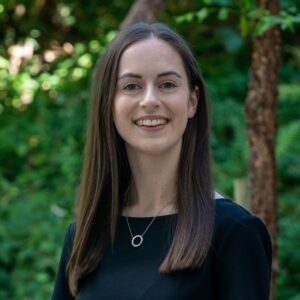
Lucy Rogers, postgraduate student, University of Birmingham, UK
“My lab visit sparked an interest in mass-spectrometry and I gained valuable training in sophisticated analytical techniques. This practical experience will help me advance in my research career and grow a wider global network of peers who I can contact for help, whether that be for research or wellbeing.”
Lucy Rogers, a postgraduate student at the University of Birmingham, UK, received a Professional Development Award of £750 from The Society. This enabled her to travel to Montreal, Canada, to attend Dr Tyler Churchward-Venne’s Exercise Metabolism and Nutrition Research Laboratory at McGill University.
The Professional Development Award provides funding for postgraduate members and full members not yet in a permanent post. It enables a laboratory visit or attendance at a training course for the development of a specific skill or technique to support their current physiology research project, or teaching, and to enhance their academic skills portfolio.
In this blog, Lucy tells us about her experience and shares how this award has supported her studies.
In March this year I was fortunate to spend two weeks in a clinical research facility in Montreal, Canada to gain theoretical and technical expertise in plasma amino acid concentration analysis. The analytical technique requires a method known as reversed phase ultra-performance liquid chromatography mass spectrometry (UPLC-LCMS).
I was working in the Research Institute’s Proteomics Platform at the McGill University Health Centre. I was excited to learn vital techniques to investigate an interesting health question. For my first human research study for my PhD, I am seeking to understand the efficacy of a novel protein source for supporting muscle health and recovery. Measuring the blood amino acid responses to ingestion of this protein should provide the clues to this query.
Applying analytical lab techniques to delve deeper into human physiology and protein metabolism
I have developed my expertise in LCMS, gaining practical experience of the steps involved in UPLC-LCMS, including extraction of plasma samples by protein precipitation and amino acid derivatisation and quantification. This, alongside the theoretical knowledge, has aided my understanding of how these techniques can be applied to human physiology and muscle protein metabolism research. I can now use these to determine blood amino acid kinetics in response to the ingestion of different sources of dietary protein.
I would be delighted if the lab work carried out through this award could lead to the publication of high-quality data around the muscle anabolic properties of a novel protein supplement. This would be a significant finding considering the potential benefits of sustainable, alternative protein sources to mitigate the threats to agriculture and food chains in the face of climate change. It is my hope that future collaborative research will arise from this training visit, which may generate important data to advance understanding in the field of human muscle protein metabolism.
I feel the experience highlighted a few areas of theoretical and technical capability that I would like to improve moving forward in my career. The training sparked an interest in the use of mass-spectrometry based analytical techniques, which led me to attend The Physiological Society Stable Isotope Tracer workshop last summer. Thanks to The Society and their developmental resources, I now have a greater understanding of how I can use these sophisticated analytical techniques.
I am keen to seek out more opportunities to gain more hands-on laboratory-based experience relating to mass-spectrometry. I see this is as essential part of my development since I will need to rely on my knowledge of these techniques over the remainder of my PhD.
Building meaningful relationships
Aside from gaining technical laboratory-based training, I was also able to present an overview of my PhD to Dr Churchward-Venne’s research group, which generated some interesting discussions around future study designs and raised some important methodological considerations.
I thoroughly enjoyed networking with members of Dr Churchward-Venne’s research group and it was exciting to hear how future collaboration may be possible in the latter stages of my PhD. Learning how the PhD and post-doctoral experience differs in Canada from the UK was enlightening and could inform my career decisions in future as to where I would like to pursue my academic interests.
Perhaps most importantly, I feel the networks I formed at McGill University will benefit my future career, considering potential research collaborations and my wellbeing as a research student, because I now have a wider network of peers to share my PhD experience with.
Develop a specific skill to help carry out your physiology research project
The professional development awards are available to postgraduate, or early career full members can apply. This includes membership transitions, i.e. a member six months into their postgraduate membership, when they had previously been an undergraduate and Masters member in the period immediately before. Members should have had at least one year of continuous membership prior to application.
If you are interested in applying to our next funding round, please visit https://www.physoc.org/grants-and-prizes/grants/professional-development-award/. The next round will open early 2023.

